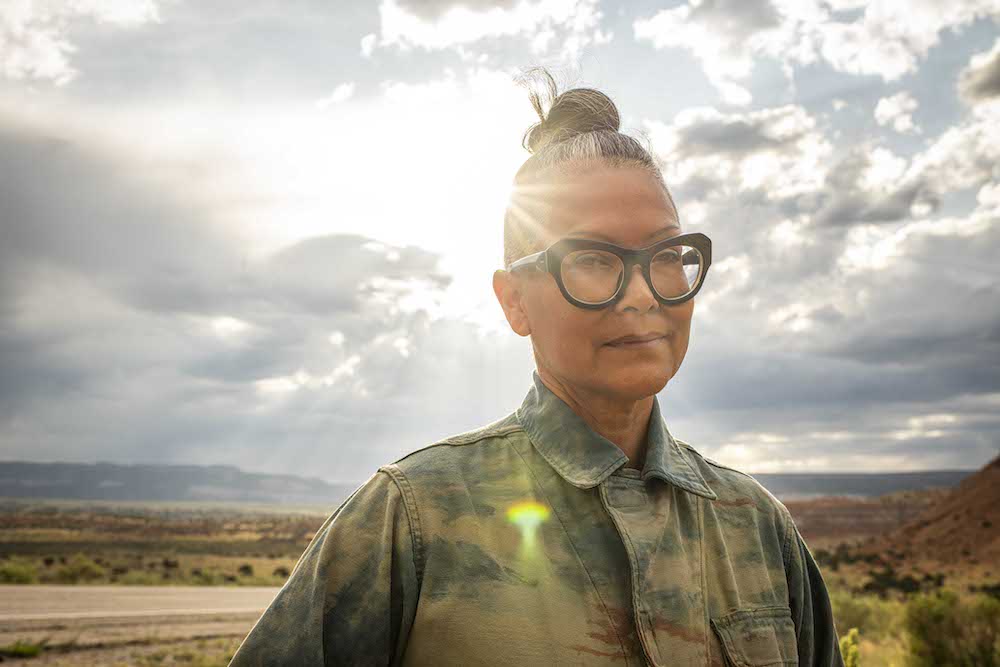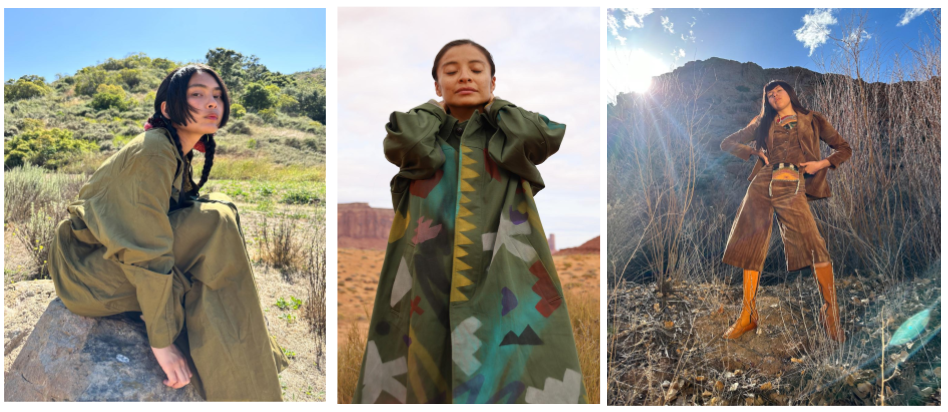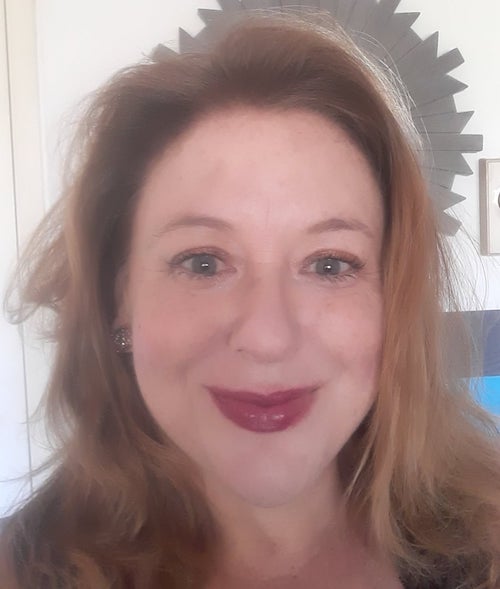
- Details
- By Tamara Ikenberg
- Indigenous Entrepreneurs
SANTA FE, N.M.– If a brand ever lived up to its name, it’s 4KINSHIP.
The Diné-woman-owned upcycled clothing brand that transforms found fabrics into chic, modern wearable art, is a vehicle for Indigenous empowerment using fashion as the fuel. At the helm of 4KINSHIP is corporate fashion industry veteran Amy Denet Deal.
“The brand platform sells fashion because we need that for the overhead,” Denet Deal said from her Santa Fe store at 1812 Canyon Road. “But the heart of everything I do is to really support Native community. We only hire Native people and train young artists here at the store to have a better future to flourish. I have that responsibility of reciprocity with the people and the land.”
Deal, who moved from Los Angeles to Albuquerque in 2019 to reclaim her heritage, has emerged as an invaluable asset to her people. Through her nonprofit work, The Diné Skate Garden Project and the 4KINSHIP Indigenous Futures Fund, she and her allies are serving the community in beautiful and beneficial ways.
For the last few months, Deal has been busy producing and hosting events promoting culture, health and, of course, kinship.
On Indigenous People’s Day, the shop hosted Sacred Cypher, an immersive art experience mixing modern and ancient traditions and bursting with chanting, hip hop and dance. The event also marked the premiere of the 4KINSHIP-produced film “We Belong Here,” directed by Diné filmmaker Wade Adakai and featuring Diné artist Raven Bright.
In September, Deal saw one of her philanthropic passion projects come to life, when Indigenous woman skateboarders from all across the country rolled into Navajo Nation’s Two Grey Hills Skate Park for the Modern Matriarchs Skate Jam.
Besides bringing Native female skaters together for a spirited gathering, the goal of the event was to provide 5,000 youth on Navajo Nation with skate equipment. The skate park itself was conceptualized and created by Deal and some powerful partners including skating legend Tony Hawk.
Deal strongly believes skateboarding is a powerful tool to improve health and prevent diabetes, combat depression, build confidence, and ultimately help heal generational trauma.
“Outdoor recreation makes us strong warriors. It gives our kids a way to process some of that emotional stuff they have to deal with at a very young age, growing up on the Res,” Denet Deal said. “Plus, there are a lot of careers within skateboarding, whether you're an athlete or artist or you go into skate-park building. It's a growing, thriving area. of the active sports industry.”
This melding of 4KINSHIP, sport, and community support fits perfectly into Denet Deal’s positive plans.
“You hear a lot about visionary people in fashion, I would rather be a solutionary,” she said. “We are going to make so many amazing solutionary things happen for our kids in the future.“
Reclaiming Indigenous Identity
Deal savors convening and creating with Indigenous relatives on a daily basis, because it's something she missed out on for decades. The formation of 4KINSHIP is rooted in Deal’s life story and reclamation of her Indigenous identity.
Her mother was a boarding school student who was ultimately sent to Ohio from her homelands in Dinétah as part of the Indian Relocation Act of 1956. When Deal was born in 1964 in the Midwest, she was plucked from her mother as part of “The Sixties Scoop” that forcibly removed Native children from their families and placed them with non-Native people in the name of assimilation.
“I was adopted out by a very loving, white family in Indiana and raised in a really beautiful community, but there were no brown people,” Denet Deal said. “My adoptive parents didn't know how it would affect me for the long term, but it definitely did. It was imposter syndrome you suffer as an Indigenous kid, where no one looks like you or speaks like you and you feel that you're not really part of this, but you don't know how to express that.“
Deal pursued her dreams of becoming a designer and attended the Fashion Institute of Technology in New York before embarking on a nearly four-decade career in the active sportswear industry. She worked her way up the ladder for companies, including Cannondale and Reebok, before becoming creative director for Puma at the age of 28.
“I lived all over the world. I designed Serena Williams' outfit when she won the US Open for the first time. I did things like that,” she said. “It sounds really good from the outside, but I was so empty in terms of knowing my life’s purpose.”
When her daughter Lily was born in 2000, Deal said she had a defining “A-ha moment” that helped illuminate her path to spiritual and career fulfillment.
“How can I work for these companies that are destroying my daughter's planet? What the heck am I doing with my career and my life?” she recalled asking herself.
Soon after, she “jumped ship” from the corporate world and launched LilaCreative, a design consulting company focused on sustainability. In 2015, Deal started an upcycled vintage clothing brand called Orenda Tribe, which she ran entirely online without a physical store. Lily worked with her mom in repurposing the clothing, and was also the brand’s model and muse.
 Designs from Amy Denet Deal's upcycled clothing company 4KINSHIP, including a glam military green gown, a hand-painted trench coat, and a foxy brown retro suit. (Photos courtesy of 4KINSHIP).
Designs from Amy Denet Deal's upcycled clothing company 4KINSHIP, including a glam military green gown, a hand-painted trench coat, and a foxy brown retro suit. (Photos courtesy of 4KINSHIP).
“I made that career change to affect Lily’s life. And that change will affect her children and her children's children,” Deal said. “It came from a moment of me understanding the messages we all get as Native people that we are part of something bigger and we're connected to all things.”
Badass Signs, Serendipitous Meeting
When Lily graduated from high school in 2019, Deal made the most important move of her life.
“I let go of all my belongings and all 20 years of relationships and everything that was my life and came to New Mexico in a U-Haul truck. The next chapter was to discover who I am as a Native woman. What does it mean to be a Diné woman? 'cause nobody taught me,” she said. “So I came back and began the reintegration of opening a shop in Albuquerque, starting to work with artists and starting to meet lots of Native people, which I'd never been able to do based on where I lived.”
Shortly after landing in Albuquerque, a serendipitous meeting revealed how vital being open to new people anytime and anywhere can be for a small business’ success.
Deal said she was checking out cool vintage neon signs in a parking lot when a friendly stranger approached her and asked what she was up to.
“I said, ‘I'm looking at these badass signs. Do you know who owns them?’ And he said, ‘I do,’” Denet recalled. “And we got into a whole conversation about things from the past.”
The man eventually introduced himself. He turned out to be Ed Garcia, part of a large property-owning family in the region. Deal’s parking-lot conversation resulted in the acquisition of 4KINSHIP’s first New Mexico retail store.
“He offered me a space at a really amazing rate because he wanted to bring more people like me into Albuquerque. He wanted Native representation in his properties. He wanted to help artists,” Deal said. “The store was already set up. I just had to fill it with merchandise. So it made it a very gentle landing for me to start my business. He is very kind and helped in so many ways. I can't say enough positive things about the Garcia family.”
Deal opened the Albuquerque 4KINSHIP store front in 2019, but the shop never got the opportunity to flourish because COVID-19 was about to explode on Navajo Nation. Instead of letting the pandemic and premature closing of the store crush her ambitions, Deal pivoted and conquered.
She repurposed the store into mission control for a massive COVID mutual aid effort that won a WebMD Health Heroes Trailblazer Award in 2021. By partnering with schools and organizations, including the World Central Kitchen and First Nations Community HealthSource in Albuquerque, 4KINSHIP and its allies launched a massive mutual aid project that distributed PPE, fed tribal schoolchildren and sheltered domestic violence victims.
Deal drew on her experience in the corporate fashion world to make the complicated operation work.
“As a Native woman that has a lot of skills in terms of creating wealth for big brands, I know how to get things from point A and point B, how to communicate and how to put all those pieces together,” Denet Deal said. “I just sat there in my little bunker working insane hours for a year and a half straight, and pulled up every connection I had.”
One of those connections was Denet Deal’s pal, the musician Jewel, who grew up among Indigenous communities in Alaska, and used her notoriety to draw attention and donations to the COVID cause. Shortly before the pandemic, Deal became acquainted with the performing artist and philanthropist who founded the Inspiring Children Foundation.
“She connected with me on Instagram as she loved our clothing and we became friends,” said Deal, who is also now Jewel’s stylist. “She's amazing. She certainly was the greatest ally in our darkest times.”
Following those exhausting months of committing herself to COVID relief, Denet Deal focused on moving to Santa Fe where she opened the current 4KINSHIP location in 2022.
“It has become the coolest, most stunning gathering space where our young ones and people of all ages just show up to hang out. I love it,” she said. “I almost feel like it's a community center because everybody stops by and checks in, and it's got that energy because we have so many young emerging designers we help get their start here, by giving them 100% of their profits since the city does so little to help them get their start.”
These days, witnessing the true kinship she has fostered fills Deal with gratitude and the sense of belonging she lacked for so long.
“I'm listening to my ancestors. They have set this place for me in my lineage to be the person I am today,” she said. “And I never would've gotten here if I hadn't come back home.”
